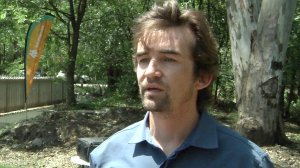Crisis looms with inadequately treated sewage

AfriForum environmental affairs adviser Marais de Vaal discusses the outcomes of the civil organisation's independent testing of South Africa's water and wastewater plants
While South Africa’s drinking water largely meets the minimum requirements, the country’s sewage treatment ecosystem is heading toward a state of crisis, civil rights organisation AfriForum’s latest yearly green and blue drop reports find.
The green drop report, which focuses on the quality of processed sewage water, was released simultaneously on Wednesday with the blue drop report, which tests the country’s drinking water.
The latest yearly green drop report, based on the testing of 140 sewage wastewater treatment works, showed that 81% of South Africa’s sewage discharge was not adequately treated before being released into rivers, with only 19% of the treatment works meeting minimum standards, said AfriForum environmental affairs adviser Marais de Vaal.
The report, which was launched at the site of a broken sewage pump station in Vereeniging, showed that, at a national level, at only 26 out of 140 sewage wastewater treatment works did effluent meet the minimum standards for discharge into a water source, leaving the effluent output of 114 plants not up to standard.
The worst performing provinces, where none of the tested treated sewerage met the minimum standards, included the Eastern Cape, which had six tests, and the Free State, which had 15 tests.
The Western Cape performed the best overall, but still, only 48% of green drop tests indicated that the treated sewage was up to standard.
In KwaZulu-Natal, only 20%, or two out of 10 tests, met the minimum standard followed by the North West, where only 17%, or four out of 23 tests, met the standard, while in Gauteng, 93% of the 15 tests showed pollution.
The blue drop report, meanwhile, found that 96%, or 185 out of 193 tests, of drinking water nationally was safe for human consumption.
Provinces with 100% safety included Limpopo, North West, Northern Cape, Eastern Cape, Western Cape and Gauteng.
In Mpumalanga, only 86%, or 30 out of 35, tests indicated that drinking was safe, and in the Free State, 93% or 25 of 27 tests indicated that drinking water was safe. In KwaZulu-Natal, 92% of tests, or 11 out of 12 tests, indicated safe drinking water.
AfriForum’s network of 161 branches had tested, in August, the 140 sewage wastewater treatment works, along with 193 drinking water tests, across all nine provinces.
“Although water tests are only carried out in places where AfriForum has branches and the results only apply to the time at which the water samples were taken, the results paint a picture of the overall health of South Africa’s water,” De Vaal commented, noting that the testing aimed to examine the presence or absence of various chemical and bacteriological components and determine, besides others, the presence of the bacteria E.coli and faecal coliform bacteria.
“The results of this year’s tests are cause for serious concern about the overall state of the management of the complete water supply chain in South Africa.”
AfriForum environmental affairs manager Lambert de Klerk said that the mismanagement of the treatment works caused a vicious cycle that could also affect the quality of drinking water.
“This will ultimately have a significant impact on the cost of drinking water. We still pay relatively little for drinking water, but it will become more and more expensive to purify water and therefore, the price of drinking water will go up.”
Article Enquiry
Email Article
Save Article
Feedback
To advertise email advertising@creamermedia.co.za or click here
Announcements
What's On
Subscribe to improve your user experience...
Option 1 (equivalent of R125 a month):
Receive a weekly copy of Creamer Media's Engineering News & Mining Weekly magazine
(print copy for those in South Africa and e-magazine for those outside of South Africa)
Receive daily email newsletters
Access to full search results
Access archive of magazine back copies
Access to Projects in Progress
Access to ONE Research Report of your choice in PDF format
Option 2 (equivalent of R375 a month):
All benefits from Option 1
PLUS
Access to Creamer Media's Research Channel Africa for ALL Research Reports, in PDF format, on various industrial and mining sectors
including Electricity; Water; Energy Transition; Hydrogen; Roads, Rail and Ports; Coal; Gold; Platinum; Battery Metals; etc.
Already a subscriber?
Forgotten your password?
Receive weekly copy of Creamer Media's Engineering News & Mining Weekly magazine (print copy for those in South Africa and e-magazine for those outside of South Africa)
➕
Recieve daily email newsletters
➕
Access to full search results
➕
Access archive of magazine back copies
➕
Access to Projects in Progress
➕
Access to ONE Research Report of your choice in PDF format
RESEARCH CHANNEL AFRICA
R4500 (equivalent of R375 a month)
SUBSCRIBEAll benefits from Option 1
➕
Access to Creamer Media's Research Channel Africa for ALL Research Reports on various industrial and mining sectors, in PDF format, including on:
Electricity
➕
Water
➕
Energy Transition
➕
Hydrogen
➕
Roads, Rail and Ports
➕
Coal
➕
Gold
➕
Platinum
➕
Battery Metals
➕
etc.
Receive all benefits from Option 1 or Option 2 delivered to numerous people at your company
➕
Multiple User names and Passwords for simultaneous log-ins
➕
Intranet integration access to all in your organisation


















